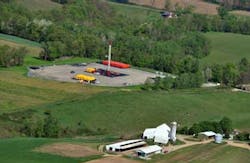The state of Georgia might soon become home to the next large-scale shale gas field, as estimates suggest that there are trillions of cubic feet of natural gas buried underground. Although the state has never produced any oil or natural gas, things may change dramatically as a number of companies are taking their first steps in exploration and drilling operations in Georgia, according to the Atlanta Journal-Constitution.
One of these businesses, an Oklahoma-headquartered company, already has two test wells and is working on a third one located on the 7,500 acres of land it has leased outside Dalton. About 70 miles away from that site, near Cave Spring, there is another project in the works. An oil, gas and development giant from Texas is planning a deeper well to extract shale gas. In addition, there are reports of at least three more companies that have approached the state with plans to start researching the Conasauga shale field — a 20-by-100 mile stretch farm and forest land, which crosses Georgia all the way from Alabama to Tennessee.
According to Rick Huggins, whose land just outside Dalton has been leased by the Oklahoma explorers, although everyone is certain there is natural gas underground there is still plenty of speculation. It is a risky endeavor — on the one hand, the timing may not be perfect, as low gas prices make production economically unviable in some parts of the country. On the other hand, Georgia simply does not have the necessary infrastructure, such as pipes, refineries, tanks and trucks to ship the production or to transform the liquid gas into energy needed to heat homes.
RELATED: Pipeline to connect Marcellus and Utica shale plays with US Gulf Coast
However, in the long run, industry experts predict that natural gas prices will rise again and extraction will become a highly lucrative business once again, as gas gradually replaces coal and other petroleum-based products. Development of the Conasauga shale field is likely to yield substantial revenues, because where there is gas, there is usually oil and other valuable liquids as well.
According to Bill Thomas, a geologist at the University of Kentucky and Georgia State, the Alabama section of the Conasauga shale field has about 625 trillion cubic feet of gas and it is reasonable to expect that a similar amount could be extracted from the Georgia part. However, the Atlanta Journal-Constitution noted that ever since the 1950s, where the state first decided to look for oil, there has not been even a drop of the liquid extracted.
If development is successful and natural gas production starts successfully in Georgia, this could make a big difference to the state economy. Georgia has always been an energy consumer, rather than producer, and if this were to change the industry would certainly boost job creation and tax revenue, commented Jeff Humphreys, UGA economist. Georgia could use a new industry that would revive the economy, as unemployment rates have remained at a relatively high level of 11.3 percent, he added.
